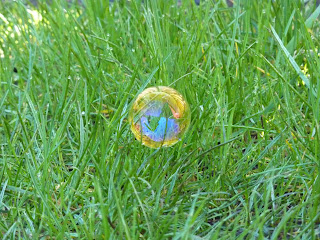 |
| The result of blowing bubbles in my backyard |
“... because a mathematical description of the coriolis deflection involves vector equations and, hence, is difficult to grasp, we will rely on a more general and somewhat inaccurate explanation of the concept.”
Now, the author did put the technical stuff in an appendix, which began with: “Although few understand the coriolis effect...”
The author's right, vector calculus can be hard, but, that’s beside the point. All sorts of things are ‘difficult to grasp’ yet we do them anyway. This textbook is for students in a first year science course. We should be inspiring them to go on and study more science, not scare them off because of perceived difficulty. Why even mention concepts are ‘difficult’ or that ‘few understand’?
Reminds me of an old article in the Onion about how science is hard (here).
We are doing ourselves a disservice when we set up things as hard - if you are interested, hard things are doable and should be tackled. I don’t think people aim to be a professional dancer or lawyer thinking they are on an easy path. Science is the same. The fact that there is so much complexity in the world around us is fascinating and we’ll never run out of new things to learn.
Why not present information in a science textbook without judgement on how difficult the concepts are? I’ve never come across another textbook that did. Unfortunately, there was more:
“Unfortunately, the concept of vorticity is difficult to grasp without a background in physics and mathematics ...”
And that was the end of the discussion of vorticity.
On a tangent... some time ago, I rushed into the living room to catch a science story on the news about how a particle was clocked traveling faster than light (which has since been shown not to be the case). At the end, the anchor (Peter Mansbridge) questioned why we should care about this result and the science correspondent (Bob McDonald) gave a good answer. Then the next story was about the auction of Elizabeth Taylor’s jewels and no one ever questioned why we should care. Interesting...
*the textbook is Invitation to Oceanography by P.R. Pinet. Over all, it reads well, has nice figures and is easy to follow.
No comments:
Post a Comment